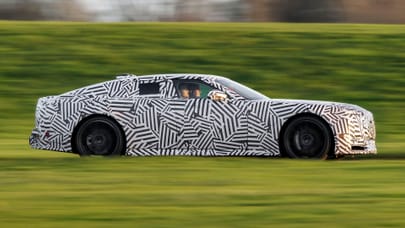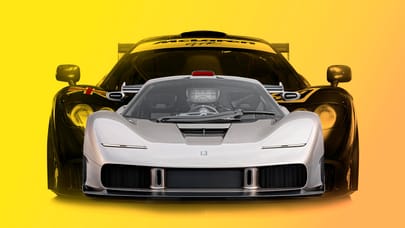
The brains behind Merc's F1 engines
Brixworth is in the middle of nowhere but this Sunday, as on many others, a bunch of guys will be locked in a room in a big building there, monitoring the real time performance of a handful of Formula One engines. Six, in fact: the two propelling Michael Schumacher and Nico Rosberg's Mercedes', the ones in Lewis Hamilton and Jenson Button's McLarens, and finally the units in Paul di Resta and Nico Hulkenberg's Force Indias. That's a lot of oil, a lot of performance, and a whole heap of stress. Around 60 parameters are constantly measured on the engines, a further 50 on the KERS system, the feedback triangulated between the circuit, the engine facility and the teams' HQs.
During TopGear.com's exclusive tour of this normally top secret Northants engineering skunkworks, the eye-popping facts and figures come at us thick and fast. ‘There are six departments here,' engineering director Andy Cowell says, ‘and our aim is simple: what can we do to make a racing car go round a circuit faster? There's a performance engineering division, an electronics one, we have guys who develop new concepts then bring them to life, a reliability group that determines if the product is good enough to leave the factory... engineers are an unruly bunch who never really want to commit to something when they can keep on being creative. So there's a management group here too, whose job it is to get them to commit.'
The current generation of F1 engines are stunningly reliable, a tribute to the near superhuman effort these guys put in, and the terrifying efficiency of their processes. Under the current regulations, Mercedes HPP manufactures 48 engines per season, plus the units used in F1 test sessions and the ones that are pushed to the limit during evaluation in the building.
In total, that adds up to about 100 engines per year, which doesn't sound like a lot until you see what goes into them. While the blocks are cast in a Daimler facility in Stuttgart, everything else is made under this roof: cylinder heads, camshafts, valves, pistons. While the truly exotic materials - like beryllium, for example - have long been banned by the FIA, an F1 engine's innards are still very special. Three different grades of aluminium are used depending on the component and the kinetic and temperature loads it has to withstand. Huge alloy billets regularly arrive at the factory, before being machined into mesmerisingly precise mechanical parts. It takes two weeks to complete a single engine.
Unsurprisingly, the armoury the people here have at their disposal is incredible. There's a supercomputer, overseen by 20 experts running constant simulations, measuring the variables and optimising the engine's envelope depending on the circuit; Monza, for example, is a real power track. Every engine is bench tested; during our visit, a unit was being subjected to a simulation of Spa, a circuit graphic on one of the banks of computer screens equating exactly to the sound we could hear. Like a pumping heart shorn of its body, it makes for a rather discombobulating sight. Do they ever blow up? Yes and no.
‘We try to catch failure before the engine lets go,' Cowell says candidly. ‘The computer data is so precise that it'll spot when that's about to happen. But if it does happen, well there's a lot of energy in an F1 engine so it just becomes a big bag of swarf. If we catch it before it lunches itself, we can analyse the problem and identify the failure.'
‘We're not actually frightened of failure,' he adds, ‘not in the factory, anyway. We have lots of them here, in various ways, and we learn from them. That's one of the things we do. On the track, we then operate within that.' Should the worst occur, there's a Tuesday morning ‘fault meeting', so there's nowhere to hide. ‘It's very aggressive,' Cowell says. ‘There are maybe 15 of us sitting in a room. You can't sit there and say, "oh, it's a one-off, it won't happen again". It's self-policing, and can be very uncomfortable.'
The current Mercedes F1 engine has around 770bhp - its specific output is a thundering 320bhp-per-litre - but because this is all about high-revving performance, it's not particularly torquey. Cowell professes to be happy with the progress his team is making on 2014's all-new 1.6-litre V6 turbo. ‘It's obviously very different, but it sounds lovely. Honestly.'
The new F1 order will be determined by fuel efficiency rather than power delivery; in effect, the most efficient car will win the Grand Prix, and it'll do so by using 35 per cent less fuel than now. Cowell has reason to be optimistic: Mercedes was the first team to score a win with a KERS-equipped car - the tech for which was developed at Brixworth - and he reckons that the system used in 2014's F1 car will be 10 times more efficient than it is currently. They're good at getting more from less, and he loves the challenge.
If you hanker after a big old V12 in F1, this might not sound particularly sexy. But it's the modern way, and the FIA is committed to improving the race-to-road technology transfer. Merc HPP's KERS expertise, meanwhile, got them the gig developing the power-train for next year's all-electric SLS. TG.com drove a prototype of this car two years ago, and was hugely impressed. Since then, the battery pack has got substantially lighter, and improved its power density and efficiency. As for the noise, well somehow they've managed to make it sound like a V8...
Top Gear
Newsletter
Thank you for subscribing to our newsletter. Look out for your regular round-up of news, reviews and offers in your inbox.
Get all the latest news, reviews and exclusives, direct to your inbox.








